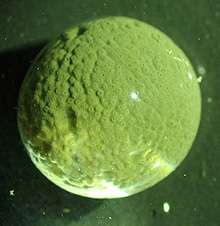Deep blue research digs up evolutionary past

(�鶹��ԺOrg.com) -- University of Queensland deep sea research has dug up an insight into the evolutionary past of some of the earliest animals.
Professor Justin Marshall, from UQ's Queensland Brain Institute and School of Biomedical Sciences, was part of an international team who found grape-like balls – called giant protists – off the coast of the Bahamas that throw into doubt long-held views about the evolution of multi-cellular organisms.
“We saw these single-cell organisms leave tracks that are similar to tracks found in the fossil record which were believed to have been made by multi-cellular organisms,” Professor Marshall said.
“This is the first evidence that organisms other than multi-cellular animals can produce such traces.
“The discovery throws into doubt when people believe multi-cellular life began.”
The fossil record of tracks like these date back 1.8 billion years, way before the earliest fossil record of the animals themselves which are found in the early Cambrian period of around 542 million years ago.
Professor Marshall said the organisms, were spotted during a deep sea expedition last year, but it was only by chance the scientists knew they had stumbled upon something unique.
“The tracks they made were like long furrows in the sea floor,” he said.
“Initially we thought the tracks might have been made by the ocean currents, but we saw them roll themselves along the sea floor, even up hills.
“We recognised the tracks these animals had made as similar to those known only from the fossil records. One of us remembered a paleontological book cover he had seen.”
“It was just one of those things, as we were not there looking for this at all. It really just shows the nature of science how we can stumble upon these things.
He said the deep sea research involved colleagues from America and use of the Harbour Branch Oceanographic Institute in an expedition called “Deep Scope” to the depths off the Bahamas to 1km.
“This really shows the importance of going to places where people have not been before,” he said.
The research was recently published in the scientific journal Current Biology.
Link:
Provided by University of Queensland















